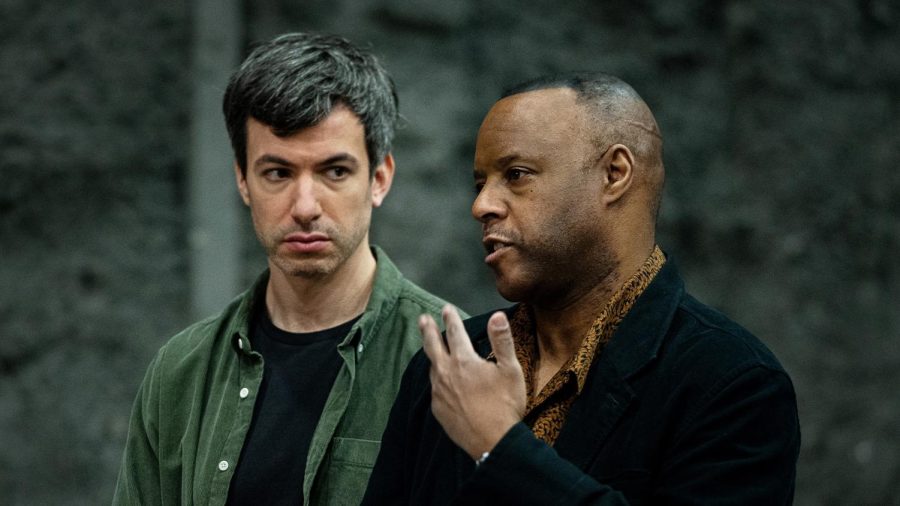“The Rehearsal” is unsettling, exploitative and deeply hilarious
In “The Rehearsal,” Nathan Fielder (left) becomes a puppeteer, manipulating the environment of his clients in increasingly absurd ways as he tries to unravel the mysteries of human behavior.
Disclaimer: Mild spoilers for “The Rehearsal”
Nobody can predict the future, but that’s no deterrent for comedian Nathan Fielder. In his new reality TV show “The Rehearsal,” which premiered in July on HBO Max, Fielder aims to help people conquer tough social situations and life events — ranging from confessing a lie to raising a child — before they even happen.
The show’s namesake and chief focus is the “rehearsal” process through which Fielder guides his Craigslist-recruited subjects, helping them plan and rehearse real-life confrontations while manipulating their lives. Meticulous to the point of excess, he stalks his clients, oversees the construction of elaborate sets and places them in situations with recruited actors, complete with complex dialogue flowcharts to cover every possible outcome. The success of these tactics is usually left up to interpretation, but when it comes to leaving his viewers intrigued (and deeply uncomfortable), Fielder consistently delivers.
The pilot episode starts things off strong, with trivia whiz Kor Skeete struggling to admit to his friends that he only possesses a bachelor’s degree after lying about having a master’s degree. For Skeete’s rehearsal, Fielder masterfully engineers the perfect setup for him to practice his confession by creating an exact replica of his favorite trivia bar and hiring an actor to play his friend berating him. From there, the tone of the episode fluctuates wildly between Fielder’s antics and his philosophical musings on the implications of what, to him, is a social experiment. Ultimately, the audience is left unsure whether to laugh or feel sorry for everyone involved.
Every aspect of “The Rehearsal” seems devised to induce as much discomfort as possible. Not the least of which is Fielder himself as he fumbles his way through emotional conversations and awkward confrontations when things don’t go as planned. Indeed, the relationship between him and his clients often borders on exploitative as it’s unclear whether they understand the extent to which they’re being puppeteered.
Fielder’s deadpan, ethically questionable comedic style first rose to prominence with “Nathan For You,” a documentary-style comedy that aired from 2013 to 2017, featuring Fielder as a business guru offering marketing “advice” to struggling companies. His unscrupulous achievements include convincing a clothing store to let attractive customers shoplift and successfully getting a staged animal rescue video to go viral on behalf of a petting zoo.
While “The Rehearsal” may not be as in-your-face funny as some of Fielder’s earlier works, the absurdity of the show’s premise still creates plenty of laugh-out-loud moments. Despite the disconcerting moral ambiguity of each episode, there’s a sincerity to the whole undertaking that keeps it from feeling simply like a prank show. Particularly toward the end of the season, as Fielder gets more and more involved in the rehearsal process, we see him genuinely struggle with the relationships he’s forming with his clients in his never-ending quest to understand why people act the way they do.
The defining feature of the show is the parenthood storyline, which stretches from the second episode to the end of the series, significantly raising the stakes of each rehearsal and lending some emotional weight to Fielder’s difficulty with relationships. Angela, a woman who wants to become a mother, is given free reign over an idyllic home in rural Oregon, and after a frustrating search for a suitable partner to rehearse the experience of parenthood with, ends up with Fielder himself as her strictly platonic co-parent. Angela’s devout Christianity and matter-of-fact belief in Satanic conspiracies frequently create awkward moments with the Jewish, socially inept Fielder.
As a Jew, I appreciated the show’s depiction of anti-Semitism and Fielder’s nods to aspects of modern Jewish life in America. On a deeper level, Fielder’s lack of social tact and difficulty getting into the mindsets of his clients are undoubtedly relatable to a broader audience and even lead to some tear-jerking moments. Somehow, despite his stone-faced demeanor and obsession with messing with people, Fielder manages to make himself one of the most endearing elements of the show.
By design, “The Rehearsal” is all about creating a scripted world, yet the show itself doesn’t feel scripted. It’s never predictable, the audience is surprised — sometimes even tricked — at every turn. The show is, of course, extremely funny, but it would be a disservice to call it a comedy when there’s so much more to it. As a comedy, social experiment and drama all in one, it’s captivating in a way unlike any show I’ve seen. And its audience seems to agree — at the end of its first run, “The Rehearsal” was immediately renewed for a Season 2.




